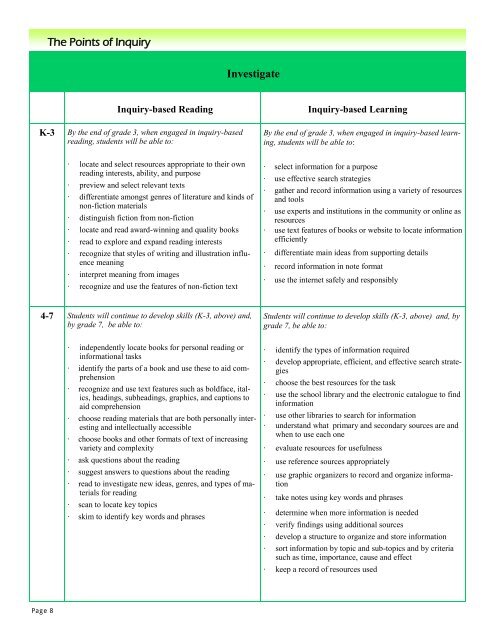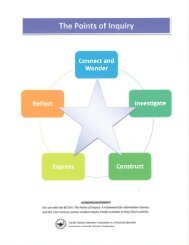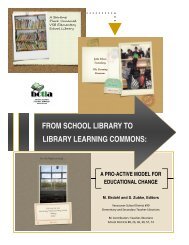PointsofInquiry
You also want an ePaper? Increase the reach of your titles
YUMPU automatically turns print PDFs into web optimized ePapers that Google loves.
The Points of Inquiry<br />
Investigate<br />
Inquiry-based Reading<br />
Inquiry-based Learning<br />
K-3 By the end of grade 3, when engaged in inquiry-based<br />
reading, students will be able to:<br />
By the end of grade 3, when engaged in inquiry-based learning,<br />
students will be able to:<br />
· locate and select resources appropriate to their own<br />
reading interests, ability, and purpose<br />
· preview and select relevant texts<br />
· differentiate amongst genres of literature and kinds of<br />
non-fiction materials<br />
· distinguish fiction from non-fiction<br />
· locate and read award-winning and quality books<br />
· read to explore and expand reading interests<br />
· recognize that styles of writing and illustration influence<br />
meaning<br />
· interpret meaning from images<br />
· recognize and use the features of non-fiction text<br />
· select information for a purpose<br />
· use effective search strategies<br />
· gather and record information using a variety of resources<br />
and tools<br />
· use experts and institutions in the community or online as<br />
resources<br />
· use text features of books or website to locate information<br />
efficiently<br />
· differentiate main ideas from supporting details<br />
· record information in note format<br />
· use the internet safely and responsibly<br />
4-7 Students will continue to develop skills (K-3, above) and,<br />
by grade 7, be able to:<br />
Students will continue to develop skills (K-3, above) and, by<br />
grade 7, be able to:<br />
· independently locate books for personal reading or<br />
informational tasks<br />
· identify the parts of a book and use these to aid comprehension<br />
· recognize and use text features such as boldface, italics,<br />
headings, subheadings, graphics, and captions to<br />
aid comprehension<br />
· choose reading materials that are both personally interesting<br />
and intellectually accessible<br />
· choose books and other formats of text of increasing<br />
variety and complexity<br />
· ask questions about the reading<br />
· suggest answers to questions about the reading<br />
· read to investigate new ideas, genres, and types of materials<br />
for reading<br />
· scan to locate key topics<br />
· skim to identify key words and phrases<br />
· identify the types of information required<br />
· develop appropriate, efficient, and effective search strategies<br />
· choose the best resources for the task<br />
· use the school library and the electronic catalogue to find<br />
information<br />
· use other libraries to search for information<br />
· understand what primary and secondary sources are and<br />
when to use each one<br />
· evaluate resources for usefulness<br />
· use reference sources appropriately<br />
· use graphic organizers to record and organize information<br />
· take notes using key words and phrases<br />
· determine when more information is needed<br />
· verify findings using additional sources<br />
· develop a structure to organize and store information<br />
· sort information by topic and sub-topics and by criteria<br />
such as time, importance, cause and effect<br />
· keep a record of resources used<br />
Page 8






